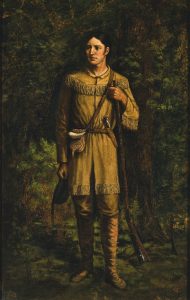I dar say you’ve all on you, if not more, frequently heerd this great she human crittur boasted of, an’ pointed out as “one o’ the gals”-but I tell you what, stranger, you have never really set your eyes on “one of the gals,” till you have seen Sal Fink, the Mississippi screamer, whose miniature pictur I here give, about as nat’ral as life, but not half as handsome-an’ if thar ever was a gal that desarved to be christened “one o’ the gals,” then this gal was that gal-and no mistake.
She fought a duel once with a thunderbolt, an’ came off without a single, while at the fust fire she split the thunderbolt all to flinders, an’ gave the pieces to Uncle Sam’s artillerymen, to touch off their canon with. When a gal about six years old, she used to play sep-saw on the Mississippi snags, and arter she war done she would snap ’em off, an’ so cleared a large district of the river. She used to ride down the river on an alligator’s back, standen upright, an’ dancing Yankee Doodle, and could leave all the steamers behind. But the greatest feat she ever did, positively outdid anything that ever was did.
One day when she war out in the forest, making a collection o’ wild cat skins for her family’s winter beddin, she war captered in the most all-sneaken manner by about fifty Injuns, an’ carried by ’em to Roast flesh Hollow, whar the blood drinkin wild varmits detarmined to skin her alive, sprinkle a leetle salt over her, an’ devour her before her own eyes; so they took an’ tied her to a tree, to keep till mornin’ should bring the rest o’ thar ring-nosed sarpints to enjoy the fun. Arter that, they lit a _large fire in the Holler, turned the bottom o’ thar feet towards the blaze, Injun fashion, and went to sleep to dream o’ thar mornin’s feast; well, after the critturs got into a somniferous snore, Sal got into an all-lightnin’ of a temper, and burst all the ropes about her like an apron-string! She then found a pile o’ ropes, too, and tied all the Injun’s heels together all round the fire,-then fixin a cord to the shins of every two couple, she, with a suddenachous jerk, that made the intire woods tremble, pulled the intire lot o’ sleepin’ red-skins into that ar great fire, fast together, an’ then sloped like a panther out of her pen, in the midst o’ the tallest yellin, howlin, scramblin and singin’, that war ever seen or heerd on, since the great burnin’ o’ Buffalo prairie!
DISCUSSION QUESTIONS
1: Why do you think Davy Crockett’s texts use hyperbole style writing? How would this engage modern readers with the author?
2: Based on the text provided, do you think Davy Crockett had any racial or sex-based biases that could be related to the time-frame or relate to other texts that we’ve read?
3: In terms of rhetoric, what do you make of Davy’s fantastical writing style? How do you think this was meant to impact an audience?


